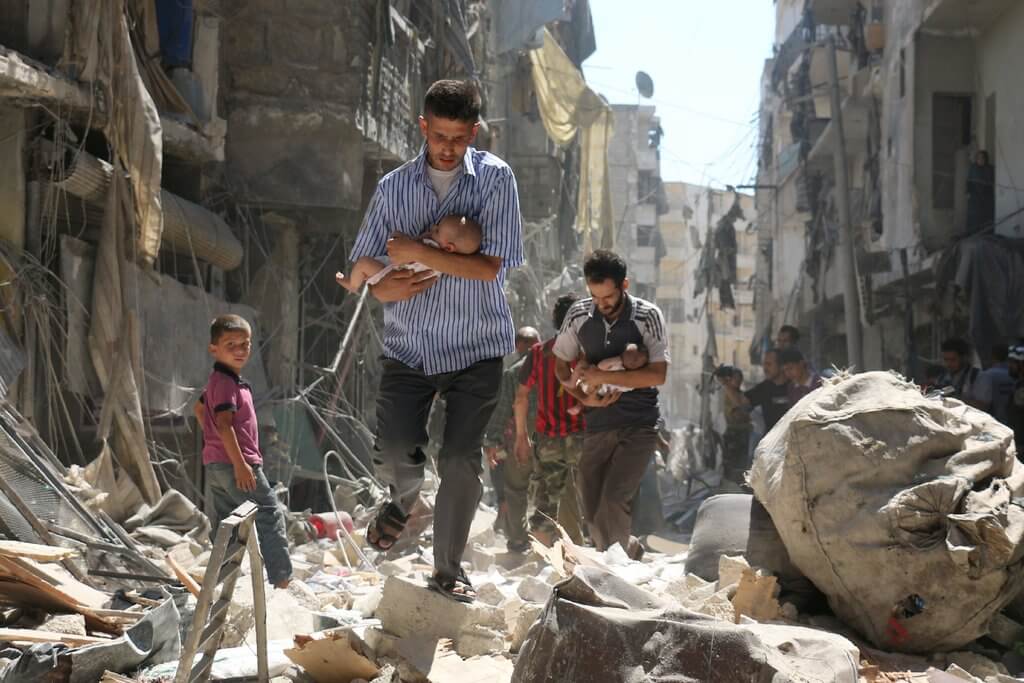Since March 2011, Syria has been engulfed in a violent struggle that has triggered humanitarian and security crises of colossal proportions. What began as a hopeful call by the country’s people for the end of Bashar al-Assad’s oppressive regime—inspired by the widely celebrated and successful ‘Arab Spring’ protests in other parts of the Middle East and North Africa—soon morphed into a brutal armed insurrection and conflict, which over the last decade has also taken the shape of an extremely complex proxy war for regional and international powers.
Like always, the impacts of the fighting and destruction have been borne disproportionately by civilians, and the consequences have been devastating. According to estimates from the United Nations Refugee Agency (UNHCR), more than 13 million people are in need of humanitarian assistance in Syria. The crisis has killed close to 400,000, forced more than five million people to flee as refugees, and displaced another six million within the nation’s borders. A new UNICEF report outlines the horrific impact of the war on children, 90% of whom are in dire need of aid and assistance. More than half a million children under the age of five in Syria suffer from stunting as a result of chronic malnutrition, 12,000 have lost their lives or have been injured from the violence, 5,700 were recruited into the fighting, and nearly 2.45 million are out of school. All of these figures have only gotten worse amid the coronavirus pandemic.
However, given the multiple and often competing foreign interests in the country, united efforts to address the Syrian people’s concerns and alleviate human suffering have unfortunately taken a backseat. Russia, Iran, Turkey, and the United States (US), among others, are all involved in the Syrian conflict, with Russia and Iran backing the Assad-led government, Turkey supporting anti-regime rebels and working to eliminate the Kurdish YPG militia in the northwest, and the US leading an international coalition to drive ISIS militants out of Syrian territory, while also targeting its regional adversaries, like Iran-backed armed groups.
Over the past few years, it has become painfully clear that—despite expressions of “grave concern” for the safety of civilians, and promises of never abandoning the most vulnerable—these nations’ security and political objectives trump the needs and demands of ordinary Syrians, who continue to endure indiscriminate airstrikes and bombings on civilian infrastructure and sites, which is only made worse by the impunity granted to perpetrators of such attacks.
Also read: Humanitarian Deconfliction and the Struggle to Protect Civilians in Syria
International organisations with the so-called mission of preserving peace and stability in the world have provided no respite either. Deep political divisions among veto-wielding members of the United Nations Security Council (UNSC) have so far paralysed the body and stymied any efforts to stabilise Syria. Since 2011, Russia has vetoed 15 UN resolutions relating to the conflict, while China has vetoed seven, effectively blocking accountability efforts and hindering humanitarian aid deliveries into the country. The US, on the other hand, while condemning the “senseless” violence in the region, has also conducted airstrikes against its foes in the country, most recently last month, when it targeted Iranian-backed militia groups, in response to rocket attacks against Americans in Iraq. The choice to hit the group in Syria, rather than Iraq, was clearly a calculated move by Washington to avoid tensions with the government in Baghdad and only goes to show the extent to which countries have used Syria as a battleground to settle their disputes.
Amidst this chaos, Syrian President Bashar al-Assad has managed to continue to cling to power, with massive financial, military, and diplomatic help from his Russian and Iranian allies. International actors have made clear that they do not want to be drawn into the wider war and have therefore taken very little effort to actually oust the embattled leader. Additionally, over the course of the conflict, the rise of the Islamic State (IS) and its terror networks played a huge role in shifting the global focus away from his regime, and instead towards confronting global security threats posed by the group. The counterterrorism operations that followed not only drove militants out but also helped Assad take back large swathes of Syrian territory, approximately 60% of which is now under government control. Though this has made it commonplace to declare the president the “victor” of the war in Syria, there is no doubt that Assad’s so-called win is a pyrrhic one, achieved after the battlefield itself has been completely destroyed. Pre-war Syria no longer exists and what remains is a country in physical and economic ruin, with a population that is deeply traumatised by endless conflict.
However, prospects for peace remain dim. The narrative surrounding the government’s “victory” has made it that much more difficult to bring it to the negotiating table, which is crucial to bring some form of stability to the country. Additionally, UN-led efforts to draft a new constitution for Syria ahead of its national elections this year have been stalled and sidelined by parallel dialogues spearheaded by Russia, Iran, and Turkey. Though these initiatives—coupled with the subsiding of much of the active fighting in the country—have led to urgent international attention being focused elsewhere, Syria continues to remain in the throes of massive debt, death, and destruction, an end to which is nowhere in sight. As UN Secretary-General António Guterres said last week, although Syria may have “fallen off the front page,” after a decade of conflict, it “remains a living nightmare.”

